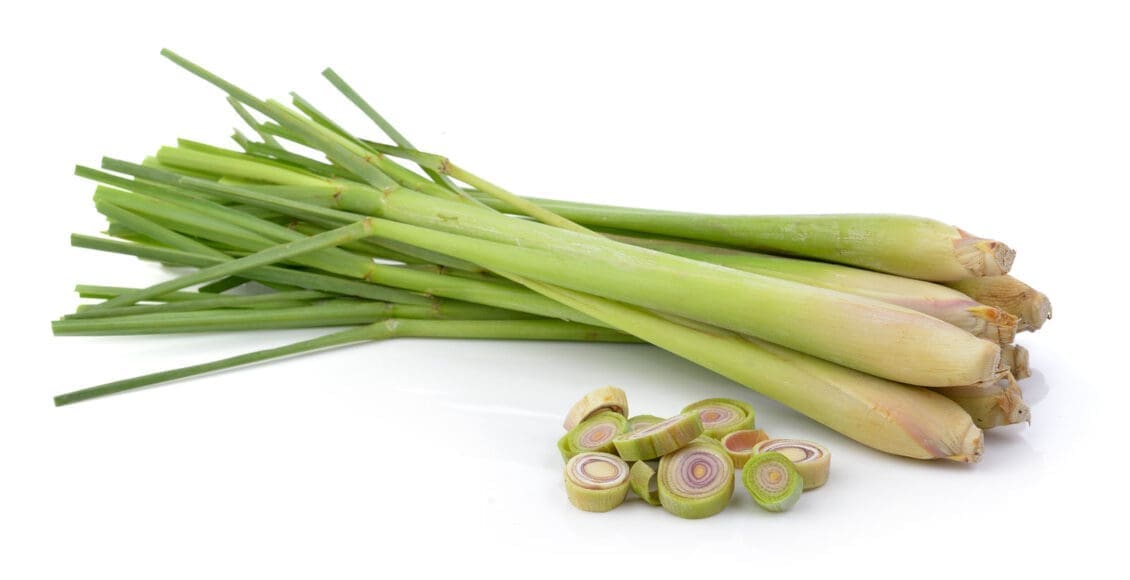Can incorporating lemongrass into a diet help individuals manage anxiety, colds, fever, inflammation, and insomnia?

Table of Contents
Lemongrass
Lemongrass, or lemongrass or citronella, is a tall grass-like herb commonly used in Southeast Asian cooking. The lower stalks and bulbs of the plant have a fresh, clean, lemony scent that is sometimes added to marinades, teas, curries, and broths. In addition to its flavoring use, lemongrass’s essential oils are used for medicinal purposes, supported by scientific evidence.
Benefits
Lemongrass has been shown to help with common ailments, such as anxiety, colds, fever, inflammation, and insomnia. It can be eaten, rubbed on the skin, or inhaled as an aromatherapy treatment. When taken orally, it is often used to calm stomach discomfort and other gastrointestinal issues, including cramps and vomiting. (DeFilipps, R. A. et al., 2018) When used as a tea, it protects the stomach lining by treating stomach ailments, indigestion, and gastric ulcers. (Khan, Nida. 2020) Lemongrass or oil is applied to the skin to treat headaches and musculoskeletal pain. As an aromatherapy treatment, the oil extract may be inhaled to treat muscle pain, infections, colds, and flu symptoms. Consumed it can help treat:
- Musculoskeletal pain
- Sleeplessness
- Rheumatism
- Cough
- Common cold
- Fever
- Anxiety
- Hypertension
- Diabetes
- Epilepsy
- Cancer prevention
However, a few studies support certain lemongrass benefits. Research has suggested that lemongrass oil added to a hair tonic may reduce dandruff. However, more studies are needed to confirm. (Chaisripipat, W. et al., 2015)
Essential Oil
Lemongrass essential oil has been studied and has been found to contain significant bioactive compounds that include:
- Citral
- Isoneral
- Isogeranial
- Geraniol
- Geranyl acetate
- Citronellal
- Citronellol
- Germacrene-D
- Elemol
These compounds contain antifungal, antibacterial, antiviral, anticancer, and antioxidant properties. (Mukarram, M. et al., 2021) Research also shows that essential oils can be therapeutic agents for treating inflammatory skin conditions and help reduce dandruff because of their antimicrobial and anti-inflammatory properties. They can also inhibit the growth of the fungi associated with causing dandruff. (Khan, Nida. 2020)
Nutrition
One tablespoon of fresh lemongrass provides around five calories, most from carbohydrates/fiber and protein. (U.S. Department of Agriculture, 2018) It is a source of fiber, carbohydrates, and vitamins A, B, and C, strengthening the body’s immune system, repairing tissue damage, and promoting cell division. It also contains:
- Magnesium – Necessary for protein synthesis, glycolysis, and muscle activity,
- Selenium – Necessary for cognitive function and fertility.
- Phosphorus – Necessary for DNA/RNA and cell membrane synthesis.
- Zinc for wound healing, growth, and development. (Khan, Nida. 2020)
Minerals include:
- Calcium – 3 milligrams
- Potassium – 34 milligrams
- Manganese – 0.2 milligrams
- Magnesium – 2.9 milligrams
- Iron – 0.4 milligrams
It also provides small amounts of vitamins, including A and C, folate, and niacin. However, lemongrass-flavored oil contains significantly more calories because it usually combines cooking oil with lemongrass extract.
Preparation and Storage
Lemongrass is becoming easier to find in stores. When choosing lemongrass, look for firm green stalks with healthy-looking bulbs attached. Some stores may sell the stalks with a good portion of the top removed. This is fine, as many recipes require using the bottom of the stalk or the bulb. To use lemongrass in teas, soups, broth, or other liquids, crush the stalks’ bottom area to release the aromatic oil. Then, immerse the pieces in the liquid to release the oils. Remove the stalks before eating or drinking the beverage. In other recipes, chopping or mincing the bulb or lower area of the stalks may be necessary before adding to a curry, salad, marinade, or stir-fry. Lemongrass can be wrapped in plastic and refrigerated for two to three weeks or frozen for up to 6 months.
Potential Side Effects
Lemongrass is safe for most when consumed in typical amounts in food. However, some concerns may arise when using it for medicinal purposes.
- Used topically, lemongrass may cause skin irritation.
- Additionally, consuming high amounts of lemongrass may cause dizziness, drowsiness, dry mouth, excess urination, and increased appetite. (Memorial Sloan Kettering Cancer Center, 2022)
- High amounts of essential oil can damage liver and stomach mucous membranes, and excessive tea intake may also affect kidney function. (Memorial Sloan Kettering Cancer Center, 2022)
- It is recommended that pregnant women should avoid lemongrass.
- Additionally, individuals undergoing chemotherapy should avoid lemongrass because it may interfere with the actions of some chemotherapeutic agents.
Injury Medical Chiropractic and Functional Medicine Clinic works with primary healthcare providers and specialists to develop a personalized treatment plan through an integrated approach to treating injuries and chronic pain syndromes, improving flexibility, mobility, and agility programs to relieve pain and help individuals return to optimal function. Our providers use an integrated approach to create customized care programs for each patient and restore health and function to the body through nutrition and wellness, functional medicine, acupuncture, Electroacupuncture, and sports medicine protocols. If the individual needs other treatment, they will be referred to a clinic or physician best suited for them. Dr. Jimenez has teamed up with top surgeons, clinical specialists, medical researchers, nutritionists, and health coaches to provide the most effective clinical treatments.
Fighting Inflammation
References
DeFilipps, R. A., & Krupnick, G. A. (2018). The medicinal plants of Myanmar. PhytoKeys, (102), 1–341. https://doi.org/10.3897/phytokeys.102.24380
Khan, Nida. (2020). Therapeutic benefits of lemongrass and tea tree. Annals of Civil and Environmental Engineering. 4. 027-29. 10.29328/journal.acee.1001022.
Chaisripipat, W., Lourith, N., & Kanlayavattanakul, M. (2015). Anti-dandruff Hair Tonic Containing Lemongrass (Cymbopogon flexuosus) Oil. Forschende Komplementarmedizin (2006), 22(4), 226–229. https://doi.org/10.1159/000432407
Mukarram, M., Choudhary, S., Khan, M. A., Poltronieri, P., Khan, M. M. A., Ali, J., Kurjak, D., & Shahid, M. (2021). Lemongrass Essential Oil Components with Antimicrobial and Anticancer Activities. Antioxidants (Basel, Switzerland), 11(1), 20. https://doi.org/10.3390/antiox11010020
U.S. Department of Agriculture. (2018). Lemon grass (citronella), raw. Retrieved from https://fdc.nal.usda.gov/fdc-app.html#/food-details/168573/nutrients
Memorial Sloan Kettering Cancer Center. (2022). Lemongrass Purported Benefits, Side Effects & More. https://www.mskcc.org/cancer-care/integrative-medicine/herbs/lemongrass
Post Disclaimer
Professional Scope of Practice *
The information on this blog site is not intended to replace a one-on-one relationship with a qualified healthcare professional or licensed physician and is not medical advice. We encourage you to make healthcare decisions based on your research and partnership with a qualified healthcare professional.
Blog Information & Scope Discussions
Welcome to El Paso's Premier Wellness and Injury Care Clinic & Wellness Blog, where Dr. Alex Jimenez, DC, FNP-C, a board-certified Family Practice Nurse Practitioner (FNP-BC) and Chiropractor (DC), presents insights on how our team is dedicated to holistic healing and personalized care. Our practice aligns with evidence-based treatment protocols inspired by integrative medicine principles, similar to those found on this site and our family practice-based chiromed.com site, focusing on restoring health naturally for patients of all ages.
Our areas of chiropractic practice include Wellness & Nutrition, Chronic Pain, Personal Injury, Auto Accident Care, Work Injuries, Back Injury, Low Back Pain, Neck Pain, Migraine Headaches, Sports Injuries, Severe Sciatica, Scoliosis, Complex Herniated Discs, Fibromyalgia, Chronic Pain, Complex Injuries, Stress Management, Functional Medicine Treatments, and in-scope care protocols.
Our information scope is limited to chiropractic, musculoskeletal, physical medicine, wellness, contributing etiological viscerosomatic disturbances within clinical presentations, associated somato-visceral reflex clinical dynamics, subluxation complexes, sensitive health issues, and functional medicine articles, topics, and discussions.
We provide and present clinical collaboration with specialists from various disciplines. Each specialist is governed by their professional scope of practice and their jurisdiction of licensure. We use functional health & wellness protocols to treat and support care for the injuries or disorders of the musculoskeletal system.
Our videos, posts, topics, subjects, and insights cover clinical matters and issues that relate to and directly or indirectly support our clinical scope of practice.*
Our office has made a reasonable effort to provide supportive citations and has identified relevant research studies that support our posts. We provide copies of supporting research studies available to regulatory boards and the public upon request.
We understand that we cover matters that require an additional explanation of how they may assist in a particular care plan or treatment protocol; therefore, to discuss the subject matter above further, please feel free to ask Dr. Alex Jimenez, DC, APRN, FNP-BC, or contact us at 915-850-0900.
We are here to help you and your family.
Blessings
Dr. Alex Jimenez DC, MSACP, APRN, FNP-BC*, CCST, IFMCP, CFMP, ATN
email: coach@elpasofunctionalmedicine.com
Licensed as a Doctor of Chiropractic (DC) in Texas & New Mexico*
Texas DC License # TX5807
New Mexico DC License # NM-DC2182
Licensed as a Registered Nurse (RN*) in Texas & Multistate
Texas RN License # 1191402
ANCC FNP-BC: Board Certified Nurse Practitioner*
Compact Status: Multi-State License: Authorized to Practice in 40 States*
Graduate with Honors: ICHS: MSN-FNP (Family Nurse Practitioner Program)
Degree Granted. Master's in Family Practice MSN Diploma (Cum Laude)
Dr. Alex Jimenez, DC, APRN, FNP-BC*, CFMP, IFMCP, ATN, CCST
My Digital Business Card


